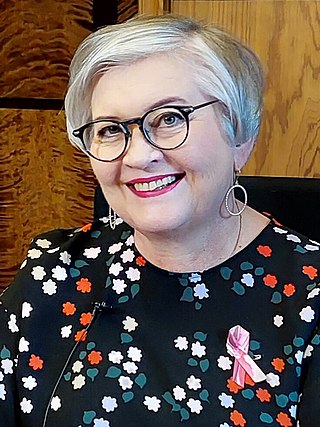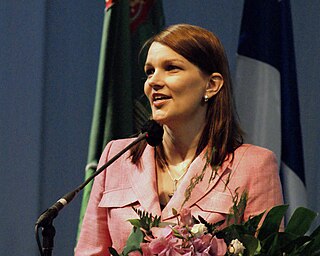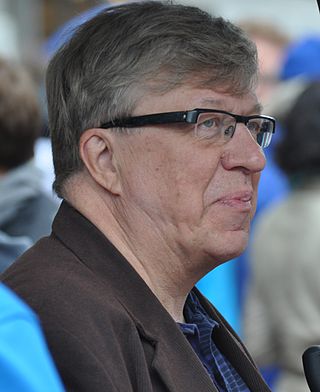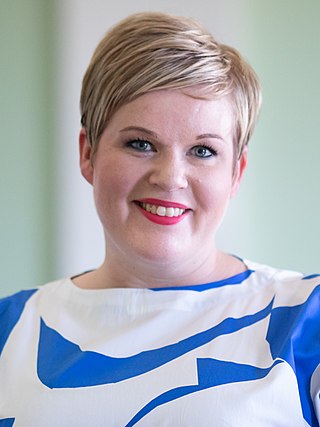The National Coalition Party is a liberal-conservative political party in Finland. It is currently the largest and the governing political party of Finland.

The Centre Party, officially the Centre Party of Finland, is an agrarian-centrist political party in Finland. Ideologically, the Centre Party is positioned in the centre of the political spectrum. It has been described as liberal, social-liberal, liberal-conservative, and conservative-liberal. The party’s leader is Antti Kaikkonen, who was elected in June 2024 to succeed former minister Annika Saarikko. As of June 2023, the party has been part of the parliamentary opposition.

Matti Taneli Vanhanen is a Finnish politician who served as Prime Minister of Finland from 2003 to 2010. He was also Chairman of the Centre Party in 2006. In his earlier career, he was a journalist. Vanhanen is the son of professor Tatu Vanhanen and Anni Tiihonen.

Finnish Centre Youth Finnish: Keskustanuoret is the biggest political youth organisation in Finland with 17 000 members. It is the youth wing of the Centre Party. It is formed by 19 regional organisations and approximately 400 local associations.

Reijo Mauri Matias Pekkarinen is a Finnish politician. He most recently served as a Member of European Parliament for Finland between 2019 and 2024. He is the Centre Party of Finland deputy and secretary, having served in various cabinet position in the Finnish government, including as Minister of Economic Affairs, Minister of Trade and Industry, and Minister of the Interior, as well as a member of parliament. He is known by the nickname "The Parliament Terrier".

Jutta Pauliina Urpilainen is a Finnish politician. She was the first female chair of the Social Democratic Party of Finland, which she led from 2008 to 2014. She was the Minister of Finance as well as the Deputy Prime Minister of Finland from 2011 to 2014. Since 1 December 2019, she is the European Commissioner for International Partnerships in the European Commission led by Ursula von der Leyen. She announced her candidacy for the 2024 election for President of Finland in November 2023.

Anu Helena Vehviläinen is a Finnish politician for the Centre Party who served as Speaker of the Finnish Parliament from 2020 to 2022. She has previously held various cabinet positions, including Finland's Minister of Local Government and Public Reforms in the Sipilä Cabinet from 2015 to 2019; Minister of Transport from May to June 2019; and Minister of Transport in the Vanhanen II and Kiviniemi cabinets from 2007 to 2011.

Parliamentary elections were held in Finland on 17 April 2011 after the termination of the previous parliamentary term. Advance voting, which included voting by Finnish expatriates, was held between 6 and 12 April with a turnout of 31.2%.

The cabinet of Mari Kiviniemi was Finland's 71st government. It was appointed by President Tarja Halonen on 22 June 2010. The cabinet's Prime Minister was Mari Kiviniemi.
The 2007 Finnish campaign finance scandal arose in the spring of 2008 due to campaign funding issues related to the 2007 elections for the Finnish Parliament held on 18 March 2007. The scandal involves mainly the campaign funding of National Coalition Party and Centre Party candidates. There were several related cases that were ongoing as of February 2012.

Timo Laaninen was the party secretary of the Centre Party in Finland from June 12, 2010 to 2016. Laaninen was the editor-in-chief of Suomenmaa party newspaper from January 2008 up to 2010. Before that he has been a political secretary in Esko Aho's cabinet to the minister of internal affairs, Mauri Pekkarinen, minister for foreign affairs Heikki Haavisto and prime minister Esko Aho. In Anneli Jäätteenmäki's cabinet he was a political secretary for prime minister Anneli Jäätteenmäki and later also for Matti Vanhanen in Matti Vanhanen's cabinet.
Opinion polling in the 2011 Finnish parliamentary election began in January 2010, just over a year before the April 2011 election. The major difference between the polls before 2011 and the polls before previous elections was the larger-than-expected support for the True Finns.

Anna-Maja Kristina Henriksson is a Swedish-speaking Finnish politician. She has served as Finland's Minister of Justice, in Jyrki Katainen's cabinet and Alexander Stubb's cabinet from 2011 to 2015, Antti Rinne's cabinet from June to December 2019 and in Sanna Marin's cabinet from December 2019 to June 2023. Henriksson was recorded to have been the country's longest-serving Minister of Justice.

The Social Democratic Party of Finland is a social democratic political party in Finland. It is the third largest party in the Parliament of Finland with a total of 43 seats.

Annika Virpi Irene Saarikko is a Finnish politician and minister who served as the Deputy Prime Minister of Finland from 2020 to 2023. She served as the leader of the Finnish Centre Party from 2020 to 2024.

Parliamentary elections were held in Finland on 19 April 2015, with advance voting taking place from 8 to 14 April. The 200 members of the Parliament of Finland were elected with the proportional D'Hondt method.
Following the 2011 election, a new government was negotiated between the leading parties of the Finnish parliament.

Katri Briitta Ilona Kulmuni is a Finnish politician who served as the 35th deputy prime minister of Finland and the leader of the Centre Party between 2019 and 2020. A member of the Centre Party, she was a Member of Parliament from 2015 to 2024. In the 2024 European Parliament election, she was elected to the European Parliament.

















